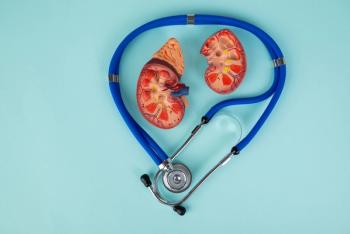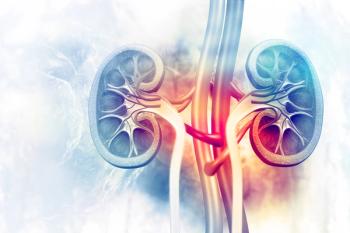
Chronic Kidney Disease
Latest News
Latest Videos

CME Content
More News

Long-term exposure to water contaminants, even below the regulatory limits, significantly increases the risk of chronic kidney disease.

Secondary analysis findings from the EMPACT-MI trial highlight empagliflozin's significant cardiovascular and kidney benefits when initiated soon after an acute myocardial infarction.

FDA issues a complete response letter for oxylanthanum carbonate, a treatment for hyperphosphatemia in patients with chronic kidney disease (CKD) on dialysis.

Smartphone-based home screening significantly boosts chronic kidney disease (CKD) diagnosis and follow-up care, enhancing patient engagement and treatment outcomes.

Iptacopan targets one of the major proteins involved in the enzymes of the alternative pathway of complement, explains Carla Nester, MD, of Stead Family Children's Hospital.

Richard Lafayette, MD, FACP, explains why a REMS program is not required for the endothelin A receptor antagonist and how patients may need to adjust should final ALIGN trial data fail to show a clinical benefit of atrasentan.

Lorundrostat shows promise in reducing blood pressure and proteinuria in patients with hypertension and chronic kidney disease (CKD), highlighting its dual-action benefits.

Race-free kidney function equations may underestimate risks for Black adults according to a new analysis.

A recent study reveals that many patients start dialysis at low-quality facilities due to convenience, highlighting significant racial disparities in care access.

Women, older adults, and low-income countries are impacted most; researchers call for urgent public health interventions.

While multiple machine learning (ML) algorithms offered similar predictive performance, the cost-effective analysis revealed stark differences in the costs associated with their use.

Recent research reveals COVID-19 significantly increases long-term kidney dysfunction risk compared with influenza, especially in older adults and men.

Childhood cancer survivors face heightened risks of chronic kidney disease and hypertension, necessitating urgent updates to monitoring guidelines for their long-term health.

New research reveals how serum soluble Klotho levels relate to chronic kidney disease risk (CKD) in patients with diabetes and hypertension.

The findings highlight important differences between therapies in managing blood glucose, blood pressure, lipids, and adverse effects in this high-risk patient population.

An analysis of an interdisciplinary care model for managing chronic kidney disease (CKD) shows hospital admissions dropped by 26% and emergency department (ED) visits decreased by 30% after clinic initiation.

This week, the Center on Health Equity & Access covered artificial intelligence, diabetes clinical trials, racial disparities in cancer antigen thresholds, and more.

Initiating chronic kidney disease (CKD) screening at age 55 yielded substantial reductions in kidney failure incidence and improvements in life expectancy across all groups.

Abstracts featured at the National Kidney Foundation Spring Clinical Meeting highlighted the renoprotective benefits of SGLT2 inhibitors in heart failure and diabetic kidney disease while emphasizing the need for strategies to increase their uptake in primary care.

Richard Lafayette, MD, FACP, Stanford University Medical Center, explains the significance of this second approval in a month for proteinuria reduction.

A series of new studies from the National Kidney Foundation Spring Clinical Meeting exhibit the association between impaired kidney function and prolonged hospital stays, higher charges, and greater resource utilization.

The analysis supports the integration of sodium-glucose cotransporter 2 (SGLT2) inhibitors into treatment paradigms for patients with chronic kidney disease (CKD) not only for their established benefits but also for addressing anemia.

Astrasentan becomes the first and only endothelin A receptor antagonist to focus on proteinuria reduction in primary immunoglobulin A (IgA) nephropathy.

Non-Hispanic Black populations face the highest risk of death from chronic kidney disease (CKD)–associated cardiac arrest, a study found.

Addressing patients with chronic kidney disease requires a commitment to data, education, and community, specifically in those affected by social determinants of health (SDOH).













